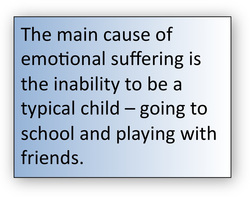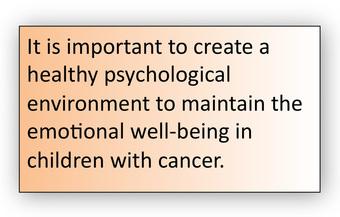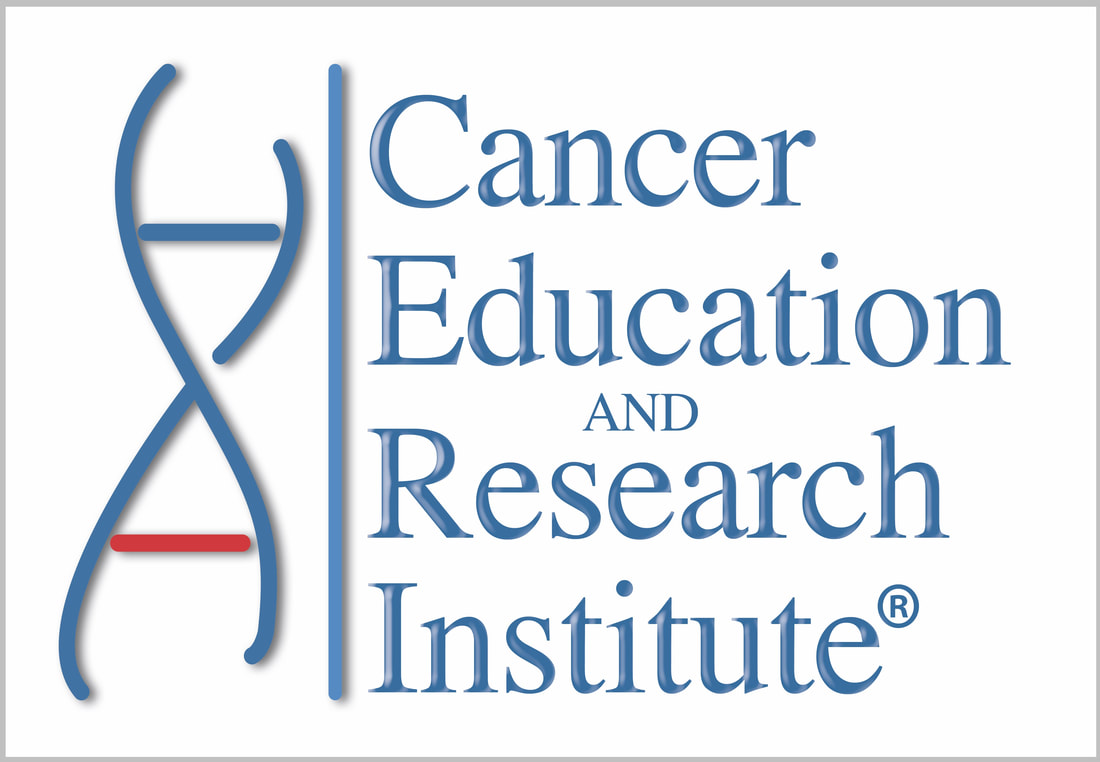The Journal of Simplified Cancer Research (JSCR) - New Article Release
Children and Cancer
What do little patients experience upon diagnosis?
By Anna Faustova, Clinical Psychologist | CERI Research Team
More details of this article can be found in our JSCR - May 2015 Issue
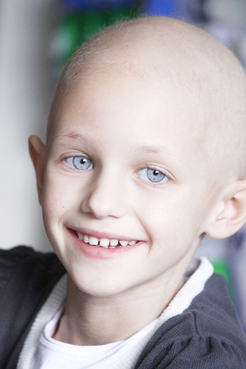
Cancer does not choose its ‘victims’
according to some specific criteria. Many people have genetic and/or
environmental predispositions, which lead to the development of cancer.
However, it seems particularly unfair when little children are diagnosed with
cancer. They just came to this world and started to discover it, but now their
lives are under the threat of a potentially deadly disease.
Little is known about children’s emotional experience due to cancer. There are several explanations for this phenomenon:
1. The key motivation to survive and to fight the disease – doctors and parents (or caregivers) focus on how to save the child’s life, leading to the emotional well-being to be perceived as a minor issue;
2. The difficulties with psychological assessment – children are not able to identify and express their personal experiences fluently. Therefore, social workers and psychologists must use games, paintings, and narrative techniques to assess the emotions the children go through. Most results are obtained from children aged 8-16 and are applied to other age groups.
Nowadays, we might confidently say that a ‘cancer’ diagnosis and its associated treatment(s) are stressful events for children regardless of their age and knowledge about the type of disease they have. The most common reactions are different symptoms of post-traumatic stress disorder, such as sleeping problems, bad moods, fear, and difficulties in adjustment to their environment [1, 2]. At the same time, many children diagnosed with cancer may experience depression, worry, sadness, or anxiety [1, 4]. Sometimes neurocognitive deficits, such as problems with writing, reading, or calculating and/or mental retardation (intellectual disability) might be experienced due to cancer relapse or the type of tumor and its location (e.g., in case of brain tumors) [3].
Little is known about children’s emotional experience due to cancer. There are several explanations for this phenomenon:
1. The key motivation to survive and to fight the disease – doctors and parents (or caregivers) focus on how to save the child’s life, leading to the emotional well-being to be perceived as a minor issue;
2. The difficulties with psychological assessment – children are not able to identify and express their personal experiences fluently. Therefore, social workers and psychologists must use games, paintings, and narrative techniques to assess the emotions the children go through. Most results are obtained from children aged 8-16 and are applied to other age groups.
Nowadays, we might confidently say that a ‘cancer’ diagnosis and its associated treatment(s) are stressful events for children regardless of their age and knowledge about the type of disease they have. The most common reactions are different symptoms of post-traumatic stress disorder, such as sleeping problems, bad moods, fear, and difficulties in adjustment to their environment [1, 2]. At the same time, many children diagnosed with cancer may experience depression, worry, sadness, or anxiety [1, 4]. Sometimes neurocognitive deficits, such as problems with writing, reading, or calculating and/or mental retardation (intellectual disability) might be experienced due to cancer relapse or the type of tumor and its location (e.g., in case of brain tumors) [3].
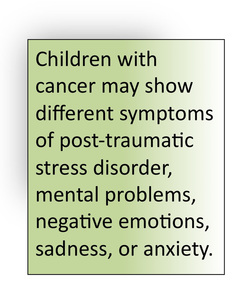
What are the reasons for these particular emotional reactions?
1. The main reason is children’s inability to execute their daily activities and to play familiar social roles (being son or daughter, classmate or soccer teammate) because of the disease [3];
2. The next reason is an extended separation from family and friends due to hospitalization at a cancer clinic for treatment [1, 4];
3. The last (but not least) reason is children’s sensitivity to caregivers’ mood – kids are able to internalize negative emotions and fear from their significant others, such as parents and siblings.
Variables such as uncertainty of diagnosis, estimated life expectancy, and physical inconvenience, cause much less negative emotional experience in children with cancer than the previously mentioned factors.
Due to the characteristics of thinking processes at the early childhood stage, children cannot imagine and completely understand the concept of their own death. This is why they are not afraid of cancer. However, the inability to have a typical childhood with playmates, games, school, and sports might cause true psychological sufferings in children diagnosed with cancer.
1. The main reason is children’s inability to execute their daily activities and to play familiar social roles (being son or daughter, classmate or soccer teammate) because of the disease [3];
2. The next reason is an extended separation from family and friends due to hospitalization at a cancer clinic for treatment [1, 4];
3. The last (but not least) reason is children’s sensitivity to caregivers’ mood – kids are able to internalize negative emotions and fear from their significant others, such as parents and siblings.
Variables such as uncertainty of diagnosis, estimated life expectancy, and physical inconvenience, cause much less negative emotional experience in children with cancer than the previously mentioned factors.
Due to the characteristics of thinking processes at the early childhood stage, children cannot imagine and completely understand the concept of their own death. This is why they are not afraid of cancer. However, the inability to have a typical childhood with playmates, games, school, and sports might cause true psychological sufferings in children diagnosed with cancer.
References:
1. Li, H.C.W., Chung, O.K., Chiu, S.Y. (2010). The impact of cancer on children’s physical, emotional and psychosocial well-being. Cancer Nursing 33: 47–54.
2. Bruce, M. (2006). A systematic and conceptual review of posttraumatic stress in childhood cancer survivors and their parents. Clinical Psychology Review, 26: 233-256.
3. Rodriguez, E.M., Dunn, M.J., Zuckerman, T., Vannatta, K., Gerhardt, C.A., Compas, B.E. (2012). Cancer-Related Sources of Stress for Children with Cancer and Their Parents. Journal of Pediatric Psychology, 37(2): 185-197.
4. Li, H.C.W., Chung, O.K.J., Ho, E.K.Y. (2011). The effectiveness of therapeutic play, using virtual reality computer games, in promoting the psychological well-being of children hospitalised with cancer. Journal of Clinical Nursing, 20: 2135–2143.
5. Hicks, M.D., Lavender, R. (2001). Psychosocial practice trends in pediatric oncology. Journal of Pediatric Oncology Nursing, 18: 143–153.
1. Li, H.C.W., Chung, O.K., Chiu, S.Y. (2010). The impact of cancer on children’s physical, emotional and psychosocial well-being. Cancer Nursing 33: 47–54.
2. Bruce, M. (2006). A systematic and conceptual review of posttraumatic stress in childhood cancer survivors and their parents. Clinical Psychology Review, 26: 233-256.
3. Rodriguez, E.M., Dunn, M.J., Zuckerman, T., Vannatta, K., Gerhardt, C.A., Compas, B.E. (2012). Cancer-Related Sources of Stress for Children with Cancer and Their Parents. Journal of Pediatric Psychology, 37(2): 185-197.
4. Li, H.C.W., Chung, O.K.J., Ho, E.K.Y. (2011). The effectiveness of therapeutic play, using virtual reality computer games, in promoting the psychological well-being of children hospitalised with cancer. Journal of Clinical Nursing, 20: 2135–2143.
5. Hicks, M.D., Lavender, R. (2001). Psychosocial practice trends in pediatric oncology. Journal of Pediatric Oncology Nursing, 18: 143–153.
The Journal of Simplified Cancer Research (JSCR) is the official journal of Cancer Research Simplified. For only $4.99 per monthly issue, [or a discounted $49.99 per year], you can gain digital access to straightforward information and articles on cancer news, diagnosis, prevention, treatment, and clinical trials. Fill out the form, make your payment, and you'll receive your copy right in your inbox! To get your copy now on The Journal of Simplified Cancer Research (JSCR) page.

